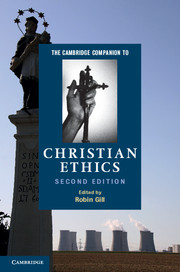Book contents
- Frontmatter
- Part I The grounds of Christian ethics
- 1 Making moral decisions
- 2 Moral traditions in eastern and western Christianity
- 3 The Old Testament and Christian ethics
- 4 The gospels and Christian ethics
- 5 The epistles and Christian ethics
- Part II Approaches to Christian ethics
- Part III Issues in Christian ethics
- Index
5 - The epistles and Christian ethics
from Part I - The grounds of Christian ethics
Published online by Cambridge University Press: 28 January 2012
- Frontmatter
- Part I The grounds of Christian ethics
- 1 Making moral decisions
- 2 Moral traditions in eastern and western Christianity
- 3 The Old Testament and Christian ethics
- 4 The gospels and Christian ethics
- 5 The epistles and Christian ethics
- Part II Approaches to Christian ethics
- Part III Issues in Christian ethics
- Index
Summary
IS THERE SUCH A THING AS ‘NEW TESTAMENT ETHICS’?
The moral teaching of the New Testament epistles may be summed up as a radical reinterpretation of the scriptures and the story of Israel in the light of the life, death and resurrection of Jesus of Nazareth. This teaching took shape to serve the needs of groups of believers in the fi rst century seeking to live out their Christian discipleship in the towns and cities of the Roman empire, from Palestine and Syria in the east to Rome in the west. Taken together, it is a body of practical wisdom on how to live in holiness as the people of God in the time between the resurrection and parousia of Christ. This practical wisdom covers matters like Jew–Gentile relations, idolatry, eating and fasting, sex and marriage, household order, work, and obligations to those in authority. It is indebted to the moral traditions of Israel on the one hand and of Greece and Rome on the other, 1 all refracted through the lens of the story of Jesus and the experience of the Holy Spirit in daily life and in gatherings for worship.
Against this background, it is not possible to talk about ‘ethics’ in the normal sense of the word. The New Testament does not present abstract reflection of a philosophical kind on the nature and grounds of moral action. It is not a compendium of systematic reflection on the good. Rather, it represents a variety of attempts to articulate the implications of conversion and baptism.
- Type
- Chapter
- Information
- The Cambridge Companion to Christian Ethics , pp. 54 - 64Publisher: Cambridge University PressPrint publication year: 2011
- 1
- Cited by

